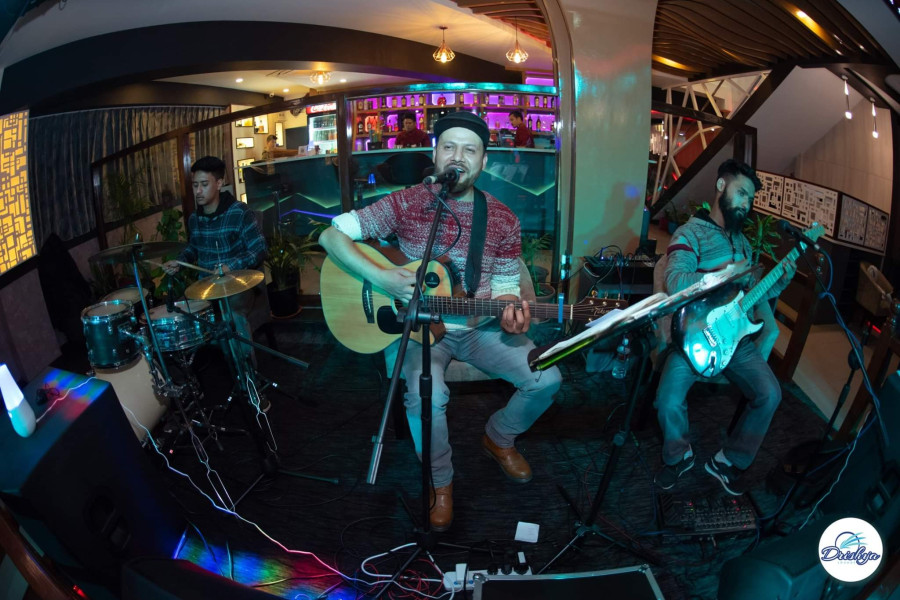Culture & Lifestyle
The uncertain future of live music performers in Kathmandu
After almost six months of lockdown, restaurants and pubs are finally opening their doors, but the prospect of resuming live music performance still remains grim.
Tsering Ngodup Lama
Since January, Jung had noticed that crowds at restaurants, pubs and clubs had started thinning. While coronavirus wasn’t as ubiquitous as it is today, the fear of the infection was building and that, says Jung, was already keeping people from visiting restaurants, pubs and clubs.
“Back in February, I knew that if the low footfall continued, it won’t be long before restaurants find it financially unwise to have live music performance, and we were worried that we’d be jobless,” said Jung.
That March 16 evening, as Jung and his band members belted Nepali, Hindi and English tracks, with the fear of an uncertain future in the back of their minds, little did they know that that fear would turn into reality soon. On March 24, Nepal went into lockdown, and overnight, musicians like Jung, who rely on live performances at restaurants, clubs, pubs and events to make a living, were rendered jobless. Six months after that lockdown, restaurants and pubs are finally opening, but the prospect of resuming live music performance still remains grim.
Before the pandemic, Jung performed at three venues every week. “We performed at Privé Nepal, GG Machaan and Drishya Lounge,” said Jung. “But apart from these three venues, we also take gigs at other venues, too. So in a week, we usually performed for four to five nights, and depending on the venue, we start around 7 or 8 pm and wrap by 11 pm to 12 am.”
Jung has been performing live music for over five years. “This is my main source of income, and I am the sole breadwinner in my family of four,” said Jung. “For some time now, I had also saved money to record my own music album.”
But when the pandemic hit, and gigs got canceled, Jung says he has had no option but to dip into the savings meant for his album. “I thought the album could wait, and I got to focus on what’s more important—to feed my family,” said Jung, who considers himself fortunate to have had savings to fall back on.
But not every musician has that luxury, says Jung.
“A few musicians, most of them relatively new to the scene, have even called me stating how critical their situation is and that they do not even have money to buy food,” said Jung.
Just a few weeks into the lockdown, Suman Nepali, vocalist of the band 4 MB, found himself worried and anxious. “With whatever little savings depleted, and with no prospect of things returning to normalcy anytime soon, I started worrying about meeting daily expenses,” said Nepali, who used to perform at four to five venues every week. “We are a three-member band, and we get around Rs 1,000 to Rs 1,500 per person for every performance. If you get a good number of gigs, you can make a decent living out of performing live music. I have been doing this over four years now and the money I made made me financially independent.”
But things changed when the lockdown prolonged and Nepali’s savings depleted. “Feeling helpless, I have had no option but to rely on my mother and my sister for money,” said Nepali. “It was a terrible feeling having to ask people for money for my daily expenses. I felt so helpless.”
With no signs of restaurants resuming live music, three months ago, Nepali started exploring options to make money. “I decided to sell vegetables. For the past three months, I have been going to Kalimati every morning at 4 am, and by 6 am, I start selling vegetables. It’s not a glamorous gig, but it helps cover household expenses,” said Nepali.
Buoyed by his ability to run his own business, three weeks ago, Nepali says he got into the poultry business. “A friend of mine who breeds black chicken told me how the chicken’s meat and eggs are in high demand. He suggested that I start breeding them for extra income, and I thought why not,” said Nepali. “I brought five chicks and started rearing them at my home. Unfortunately, one died, and now I have four left.”
For additional cash, Jung says he too has taken up a part time job as well. “I have started managing the social media accounts for a group that has been distributing free meals to people struggling to make ends meet due to the lockdown,” said Jung.
Apart from grappling with financial challenges, musicians say that the sudden absence of work, which upended their lifestyle as a musician, brought with it emotional and mental challenges.
“Before the pandemic, I was used to going out almost every night to perform. I would interact and socialise with dozens of people on a daily basis. But all of that came to a sudden end when the lockdown started. From leading that kind of life to spending days and nights at home, the change was mentally jarring,” said Jung.
During the first six weeks of the lockdown, Jung says that he had trouble dealing with all that was happening.
“Mentally, I wasn’t in a very good state. Financial concerns and the drastic change in lifestyle ended up making me easily irritated and short-tempered. It took me weeks to gather myself mentally. I started meditating and going on walks, and began to have a more positive outlook at things and started investing more time into exploring and researching more about music.”
Nepali, who lives alone, admits that things weren’t easy. “I sorely missed everything that comes with performing live music—from the crowd, the applause, and the energy. And on top of that, concerns over money just made things worse,” said Nepali.
Both Jung and Nepali say that the pandemic has taught them the importance of having more than one source of income and to not rely on music alone as a source of income. “I have been exploring part time jobs that would allow me to make some extra income while also ensuring that I can give time to my music,” said Jung.
Nepali plans to streamline his vegetable business and take it forward. “As a musician, I work mostly at evenings and nights. During the free day I am usually free, but before the pandemic, it never occurred to me that I should use the day time to do something else that would allow me to pay the bills,” said Nepali. “But the pandemic has made me realise that I need to use my free time wisely.”
According to Nepali, a restaurant in Baneshwor has started having live music. “It’s a positive start, and I hope that other restaurants will soon follow suit. But even if restaurants, many of which have suffered immense losses, do start live music, they are very unlikely to be in a position to pay musicians like us what they used to,” said Nepali. “We will have to compromise so that we can at least start taking baby steps towards normalcy and start doing what we love as musicians, which is to perform. I have missed holding a mic in front of a crowd, and I can’t wait to do it again.”




 9.7°C Kathmandu
9.7°C Kathmandu

.jpg&w=200&height=120)













